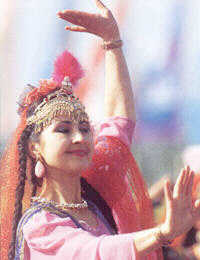 The Ozbek ethnic minority, with a population of 14,502 (as of 1999), is scattered over wide areas of the Xinjiang Uygur Autonomous Region. Most of the Ozbeks live in compact communities in Yining, Tacheng, Kashi, Urumqi, Shache, and Yecheng.
The Ozbek ethnic minority, with a population of 14,502 (as of 1999), is scattered over wide areas of the Xinjiang Uygur Autonomous Region. Most of the Ozbeks live in compact communities in Yining, Tacheng, Kashi, Urumqi, Shache, and Yecheng.
The Ozbek ethnic group has its own language which belongs to Turki Austronesian of the Altai Phylum. Ozbek characters are phonetic words based on the Arabian alphabet. Due to frequent economic exchanges with the local Uygurs and Kazaks, Ozbek people widely use the Uygur and Kazak languages.
The name Ozbek first originated from the Ozbek Khan, one of the local rulers under the Mongol Empire in the 14th century. Himself a Moslem, the Ozbek Khan spread Islam in his Khanate. In the 15th century, a number of Ozbeks moved to the Chuhe River valley, where they were called Kazaks. Those who remained in the area of the Khanate continued to be known as Ozbeks, who later formed the Ozbek alliance. The ancestors of the Ozbek group moved to China's Xinjiang from Central Asia in ancient times. In the Yuan Dynasty (1271-1368), Ozbek merchants often traveled along "the Silk Road" through Xinjiang to do business in inland areas. Later on, Ozbek merchants from Central Asia began to settle in certain cities in Xinjiang, and the number grew with each passing year and expanding to a number of other places in Xinjiang.
Most Ozbek people are city dwellers. They are mainly engaged in trade, education, science, and handcraft industries. A small part of the population, living in southern Xinjiang, is engaged in agriculture.
The Ozbeks believe in Islam and its customs. Ozbek dress and eating habits are basically the same as those of the Uygurs and Kazaks. Ozbeks are adept at singing and dancing. Their dance is resilient and lively. Most of their musical instruments are percussion instruments or hand shaken music makers. Women there are good at embroidering. Major Ozbek festivals include the Kaizhai Festival, Corban Festival, and Almsgiving Festival.
